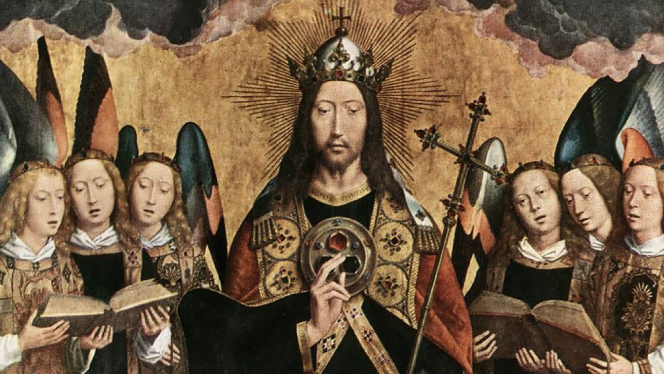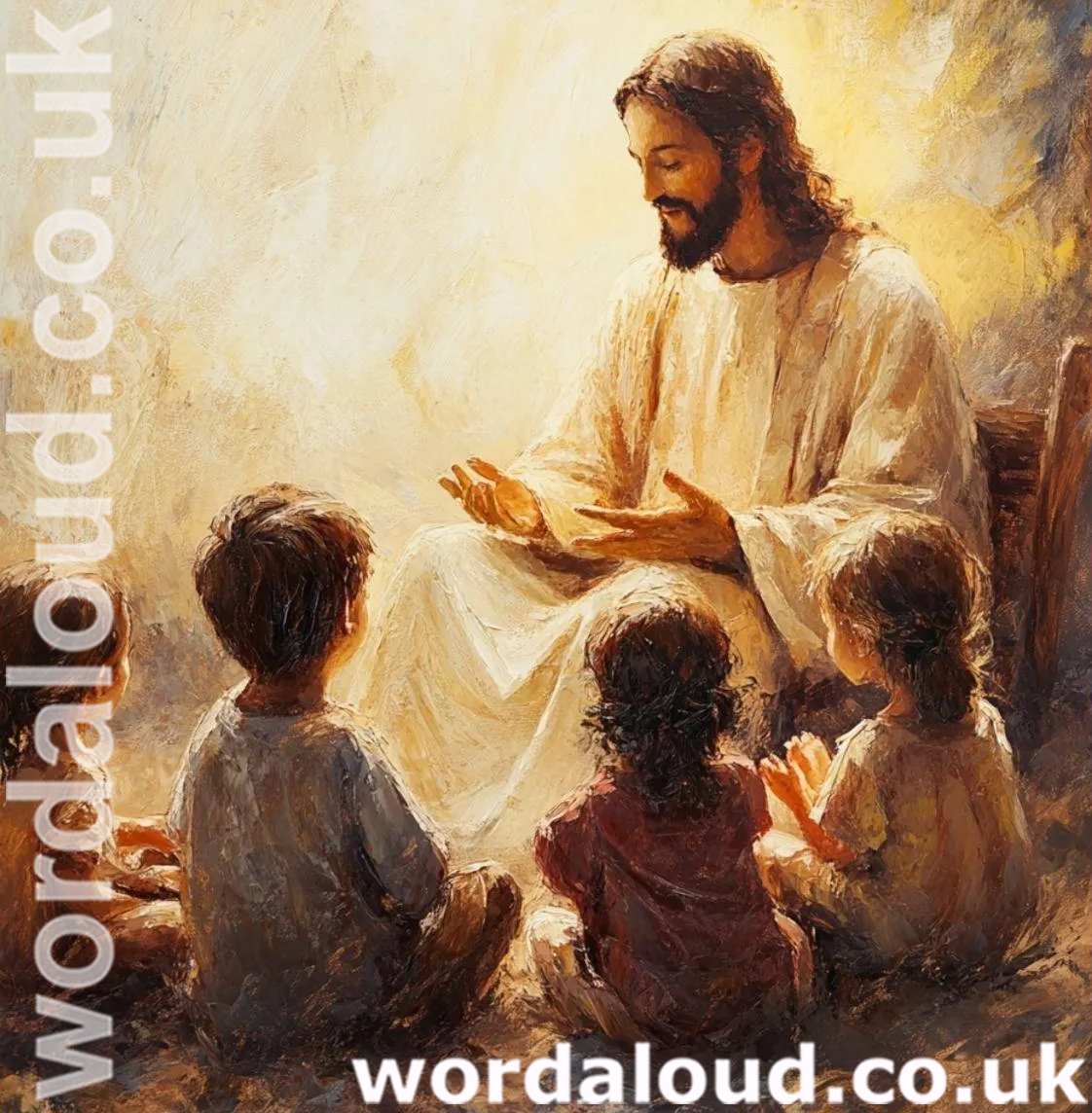Christian Art | Jesus Of Nazareth | Jesus Christ The King
Matthew 25 31-46 – 34th Sunday Year A – Christ the King (Audio Bible KJV, Spoken Word)
31 ¶ When the Son of man shall come in his glory, and all the holy angels with him, then shall he sit upon the throne of his glory:
32 And before him shall be gathered all nations: and he shall separate them one from another, as a shepherd divideth his sheep from the goats:
33 And he shall set the sheep on his right hand, but the goats on the left.
34 Then shall the King say unto them on his right hand, Come, ye blessed of my Father, inherit the kingdom prepared for you from the foundation of the world:
35 For I was an hungred, and ye gave me meat: I was thirsty, and ye gave me drink: I was a stranger, and ye took me in:
36 Naked, and ye clothed me: I was sick, and ye visited me: I was in prison, and ye came unto me.
37 Then shall the righteous answer him, saying, Lord, when saw we thee an hungred, and fed thee? or thirsty, and gave thee drink?
38 When saw we thee a stranger, and took thee in? or naked, and clothed thee?
39 Or when saw we thee sick, or in prison, and came unto thee?
40 And the King shall answer and say unto them, Verily I say unto you, Inasmuch as ye have done it unto one of the least of these my brethren, ye have done it unto me.
41 Then shall he say also unto them on the left hand, Depart from me, ye cursed, into everlasting fire, prepared for the devil and his angels:
42 For I was an hungred, and ye gave me no meat: I was thirsty, and ye gave me no drink:
43 I was a stranger, and ye took me not in: naked, and ye clothed me not: sick, and in prison, and ye visited me not.
44 Then shall they also answer him, saying, Lord, when saw we thee an hungred, or athirst, or a stranger, or naked, or sick, or in prison, and did not minister unto thee?
45 Then shall he answer them, saying, Verily I say unto you, Inasmuch as ye did it not to one of the least of these, ye did it not to me.
46 And these shall go away into everlasting punishment: but the righteous into life eternal.
We celebrate Christ the King in this, the final Sunday of the liturgical year with the last of our Sunday readings from Matthew’s Gospel. Here Christ’s Sermon in the Temple reaches its glorious conclusion as he speaks of his coming in glory to judge all nations and to lead the faithful to the Kingdom of God.
Christ prepares to be crucified. This may seem very strange as we look forward to Advent, and these really are the events of Holy Week. And yet this declaration of Christ’s coming again can be seen as a wonderful culmination of the Church year. Christ’s promise of resurrection and eternal life marks the summit of Christian faith. The declaration of Christ the King, our knowledge Christ is King, is a wonderful thought to carry through the coming weeks of Advent as we prepare to celebrate Christ’s birth.
The Sermon in the Temple must have been challenging for those who were there to hear. The Pharisees and scribes have been directly attacked. Christ has brought his sword to the heart of established Jewish religion. The destruction of the Temple has been foretold. We can hardly imagine how unthinkably threatening this would have been to the Jewish faithful, and how very strange it must have been to hear Jesus suggesting his own precious body would replace the Temple through his resurrection. Christ has warned his disciples. Beware of hypocrites. Beware of false prophets. Stay alert. Use what has been given you. Deal justly with your fellow human beings. As he concludes with today’s Bible verses, these ideas come together with a revelation of judgement day.
Jesus speaks of his return being accompanied by angels:
31 When the Son of man shall come in his glory, and all the holy angels with him, then shall he sit upon the throne of his glory: 32 And before him shall be gathered all nations: and he shall separate them one from another, as a shepherd divideth his sheep from the goats: 33 And he shall set the sheep on his right hand, but the goats on the left.
Jesus’ words here follow those words spoken by Daniel the prophet:
13 I saw in the night visions, and, behold, one like the Son of man came with the clouds of heaven, and came to the Ancient of days, and they brought him near before him. 14 And there was given him dominion, and glory, and a kingdom, that all people, nations, and languages, should serve him: his dominion is an everlasting dominion, which shall not pass away, and his kingdom that which shall not be destroyed. (Daniel 7 13-14)
The Son of man is a Semitic expression simply meaning human being. It has been used when God addresses people, to emphasise the great gulf between the divine and the human. In Daniel, though, the term acquires a new meaning. One like the Son of man comes in a way that transcends humanity, to be given dominion, everlasting rule, over all the peoples. In ancient times, the King is the supreme judge. This is Christ our King.
As with the preceding parables, there is to be a judgement. Here Christ gives new and powerful meaning to the lesson of, for example, the Parable of the Talents. There will be a separation of the sheep from the goats – as a shepherd would separate the two at the end of the day, because sheep prefer to sleep in the open and goats under shelter – and this separation, now understood as a judgement, will be based upon whether a person has seen Christ in his fellow human beings. To the blessed he says these words: ‘I was an hungred, and ye gave me meat: I was thirsty, and ye gave me drink: I was a stranger, and ye took me in: Naked, and ye clothed me: I was sick, and ye visited me: I was in prison, and ye came unto me.’ And Jesus explains his meaning: ‘Inasmuch as ye have done it unto one of the least of these my brethren, ye have done it unto me.’
We may here consider two interpretations of this promise. One is a message of philanthropy: give to the poor; consider people’s needs; show friendship; live like a decent human being. As Christians, we aim always to see Christ in other people. This is one of the visible signs of our Christianity. There is a second interpretation as well, which can sit with this first. Consider Jesus’ words to his disciples as he sends them to preach in Matthew 10:
40 He that receiveth you receiveth me, and he that receiveth me receiveth him that sent me. 41 He that receiveth a prophet in the name of a prophet shall receive a prophet’s reward; and he that receiveth a righteous man in the name of a righteous man shall receive a righteous man’s reward. 42 And whosoever shall give to drink unto one of these little ones a cup of cold water only in the name of a disciple, verily I say unto you, he shall in no wise lose his reward.
We may think again of the Parable of the Talents. Even the least of us has the gift of Christ and his message to spare. As the followers of Christ are prepared to go through all the nations speaking his word, they are told that people will be judged upon whether they have responded to the Christian message as spoken by the least of the disciples and not only by powerful religious leaders. Christ’s message can be spoken by us all, and we should listen to Christ’s message in everyone.
In this great celebration of Christ the King, we recall that Christ’s Kingdom is alive in each one of us. We celebrate this glorious fact of faith as we conclude the Church year and anticipate Advent.
‘For those of us who press forward unceasingly, the kingdom of God which is within us will reach its full completion when the apostle’s words are fulfilled, that Christ, with all his enemies subject to him, will deliver the kingdom to the Father so that God may be all in all. And so, praying unremittingly in the spirit which the Word inspires in us, let us say to our Father who is in heaven: “Hallowed be thy name. Thy kingdom come.”’ Origen: On Prayer








